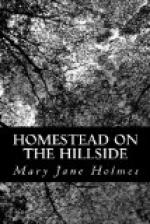Pointing out the spot to Margaret, he said, “Tell me truly, Maggie, did you love your father or your mother best?”
Mag looked wonderingly at him a moment, and then replied, “While mother lived I loved her more than you, but now that she is dead, I think of and love you as both father and mother.”
“And will you always love me thus?” asked he.
“Always,” was Mag’s reply, as she looked curiously in her father’s face, and thinking that he had not said what he intended to when first he drew her there.
Just then the carriage drove up, and after a few good-bys and parting words Ernest Hamilton’s children were gone, and he was left alone.
“Why didn’t I tell her, as I intended to?” thought he. “Is it because I fear her—fear my own child? No, it cannot be—and yet there is that in her eye which sometimes makes me quail, and which, if necessary, would keep at bay a dozen stepmothers. But neither she, nor either one of them, has aught to dread from Mrs. Carter, whose presence will, I think, be of great benefit to us all, and whose gentle manners, I trust, will tend to soften Mag!”
Meantime his children were discussing and wondering at the strange mood of their father. Walter, however, took no part in the conversation. He had lived longer than his sisters—had seen more of human nature, and had his own suspicions with regard to what would take place during their absence; but he could not spoil all Margaret’s happiness by telling her his thoughts, so he kept them to himself, secretly resolving to make the best of whatever might occur, and to advise Mag to do the same.
Now for a time we leave them, and take a look into the cottage of Widow Carter, where, one September morning, about three weeks after the departure of the Hamiltons, preparations were making for some great event. In the kitchen a servant girl was busily at work, while in the parlor Lenora was talking and the widow was listening.
“Oh, mother,” said Lenora, “isn’t it so nice that they went away just now? But won’t Mag look daggers at us when she comes home and finds us in quiet possession, and is told to call you mother!”
“I never expect her to do that,” answered Mrs. Carter. “The most I can hope for is that she will call me Mrs. Hamilton.”
“Now really, mother, if I were in Mag’s place, I wouldn’t please you enough to say Mrs. Hamilton; I’d always call you Mrs. Carter,” said Lenora.
“How absurd!” was the reply; and Lenora continued:
“I know it’s absurd, but I’d do it; though if she does, I, as the dutiful child of a most worthy parent, shall feel compelled to resent the insult by calling her father Mr. Carter!”




